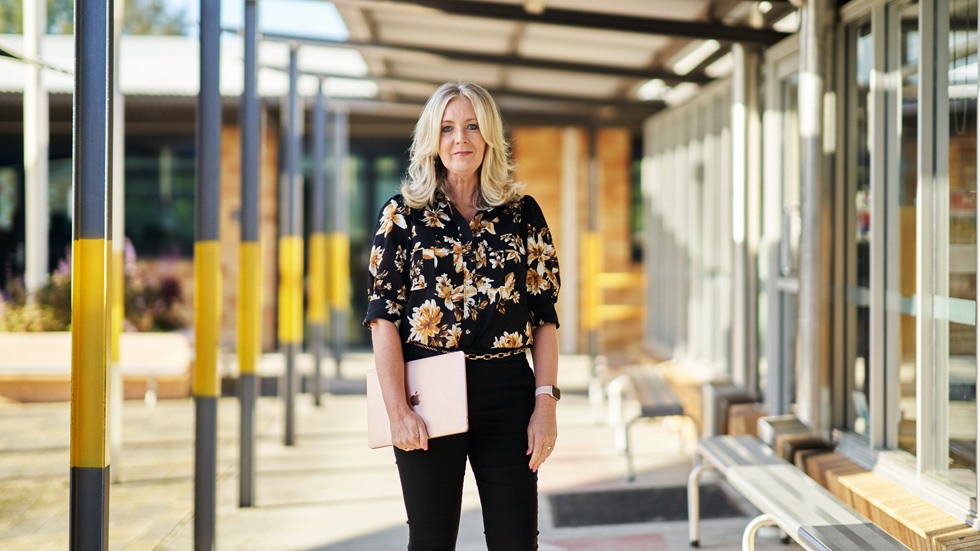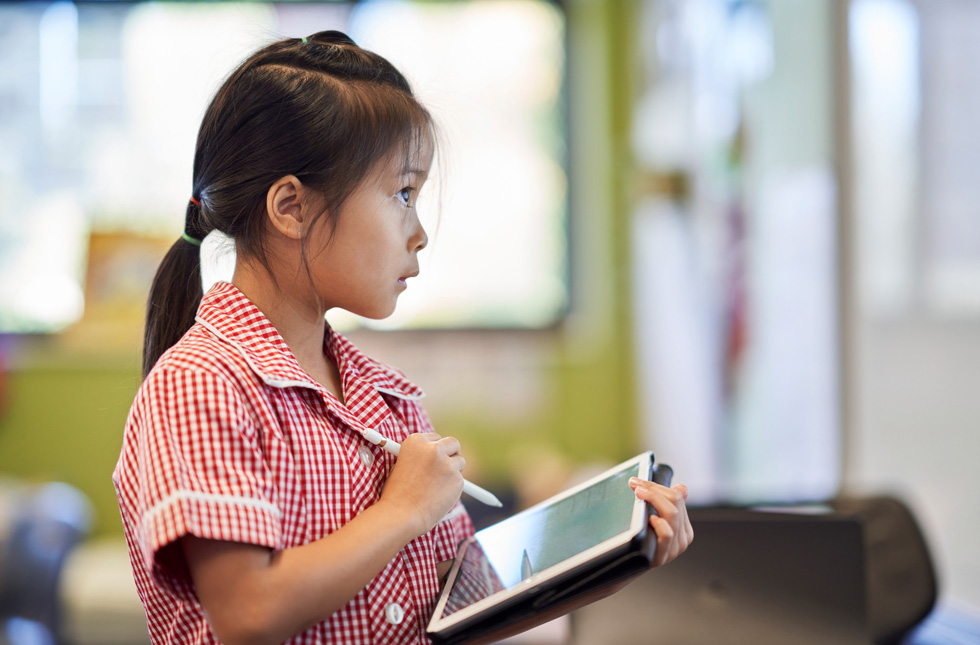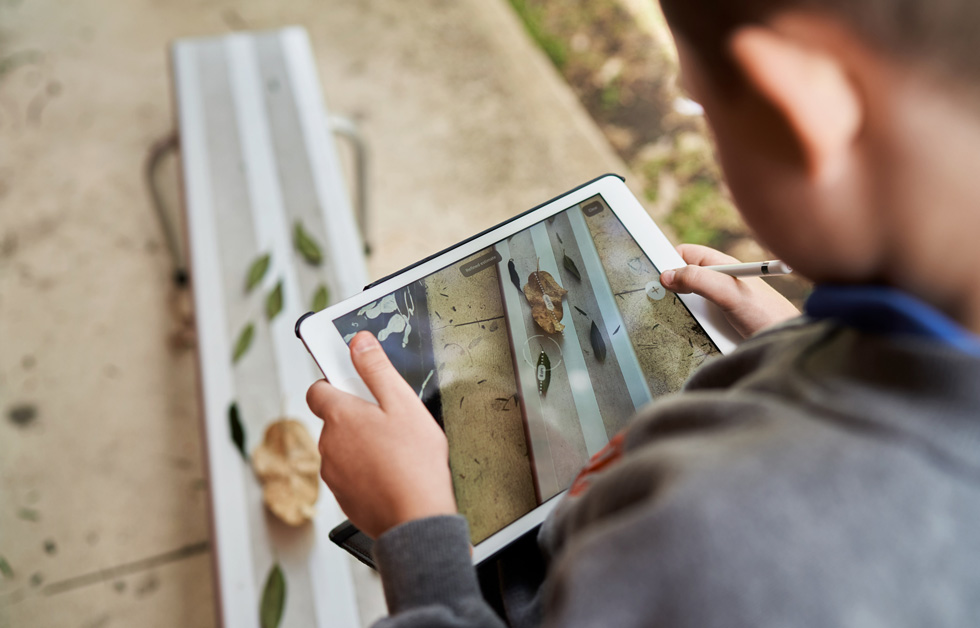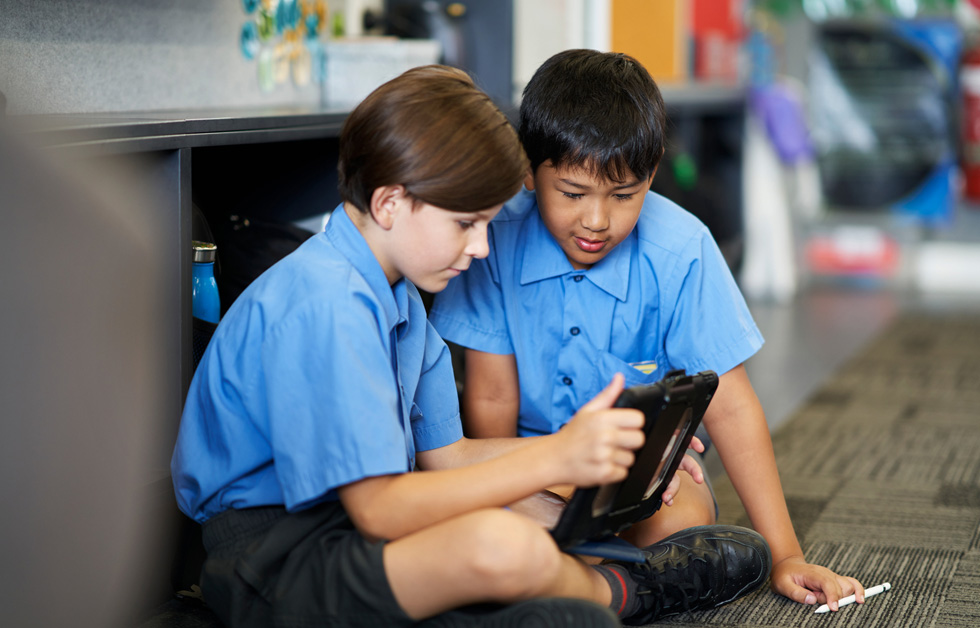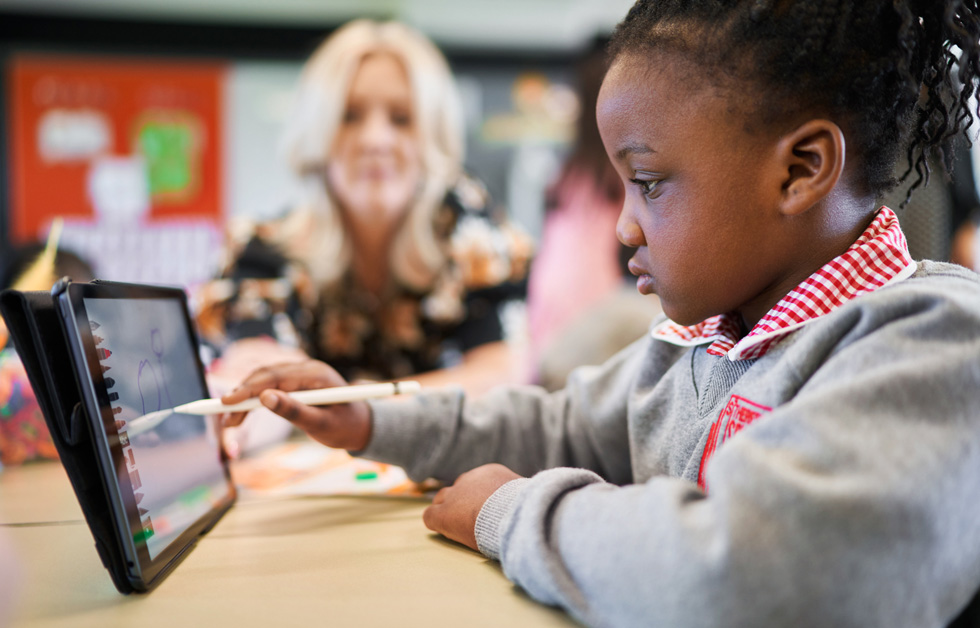FEATURE
26 March 2021
Australian primary school drives innovation and creativity with iPad
St Therese Catholic Primary School shares lessons learned, launches augmented reality kindergarten classroom
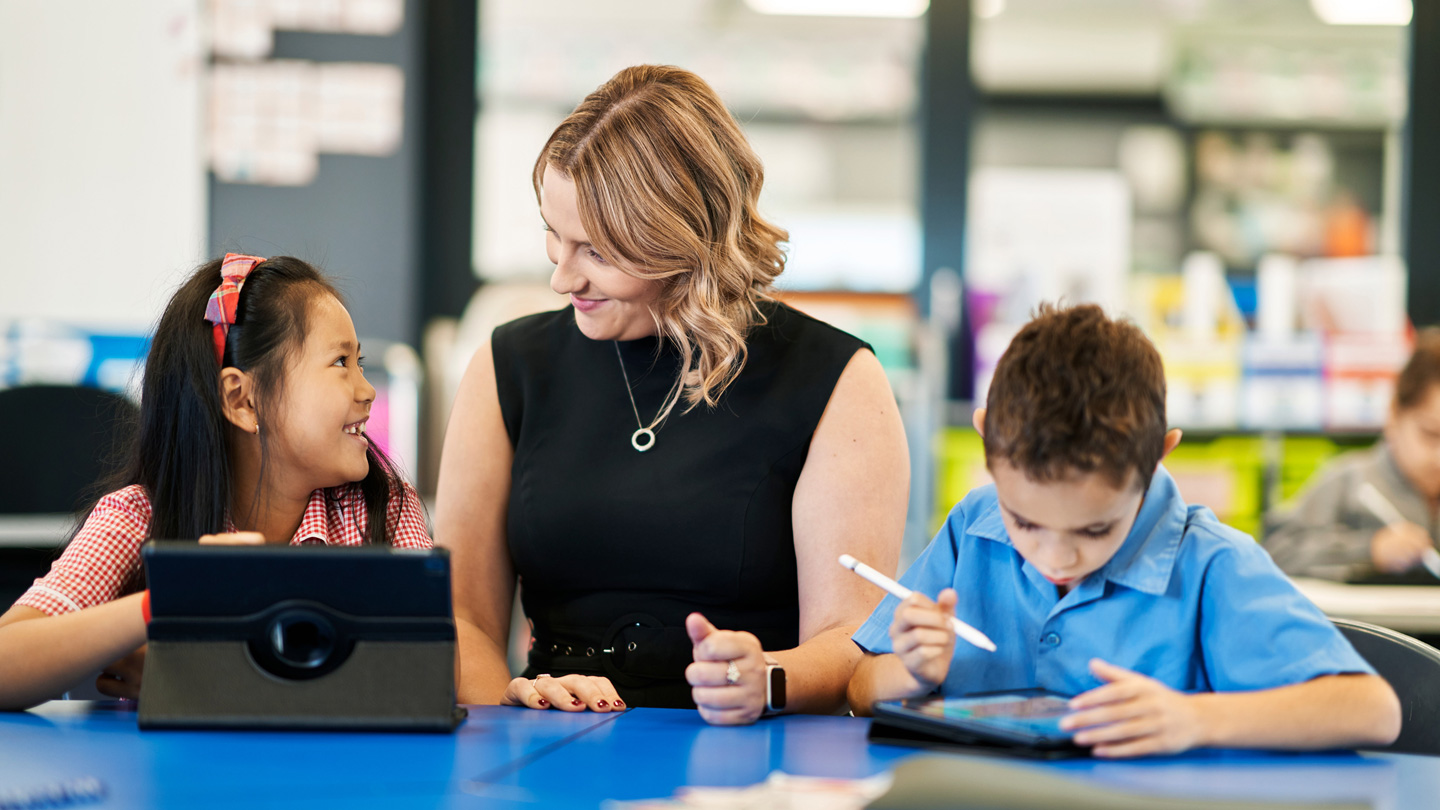
St Therese Catholic Primary School credits its established one-to-one iPad initiative with its smooth pivot to remote learning when the global COVID-19 pandemic prompted a national lockdown. Now back in the classroom, students Kimberly Le and Kieran Rice show teacher Emily Swallow their digital schoolwork portfolios, a remote learning initiative that is now standard practice across the school.
Located deep in the heart of Sydney’s southwestern suburbs in a low socioeconomic area, a local primary school has built on its existing one-to-one iPad initiative to find innovative ways to engage every one of its students during the global pandemic, and beyond.
With a community of students representing 50 different cultures, of which 73 percent are from non-English-speaking backgrounds and three-quarters speak English as a second language, St Therese Catholic Primary School turned to iPad to help them flourish against all odds.
“All of our students have the right and the capacity to learn, no matter what challenges they may be facing,” says Michelle McKinnon, principal of St Therese Catholic Primary School in Sadleir Miller. “iPad doesn’t just allow our students to think outside of the box — they can redesign the box on their own terms. It gives our students the freedom to explore and express their ideas in the way that makes the best sense to them. That could be in writing, as an audio report, via a video presentation, or even an animation that they create themselves.”
Agents of Innovation
McKinnon credits St Therese’s established one-to-one iPad initiative with the school’s smooth pivot to remote learning when the global COVID-19 pandemic prompted a national lockdown: “When every school in the country suddenly had to shift to remote learning, the effort we had spent embedding iPad and the Everyone Can Create content into every aspect of teaching and learning meant we had a solid foundation from which our students could continue to learn without interruption.”
“The creativity of our students really hit us — they were so clever at sharing what they’d learned,” says McKinnon. “Students shared their own passions and interests more freely in the remote setting, revealing previously undiscovered talents and strengths.”
A self-directed learning program invited children to showcase their talents by selecting their own research topics while they studied at home. Using Keynote, iMovie, Pages, Text to Speech, and stop-motion animation, students shared their findings on subjects as wide-ranging as the Great Barrier Reef, painter Vincent van Gogh, and disease prevention in horses.
During lockdown, students used the Seesaw app to create digital schoolwork portfolios and share them with teachers. These proved so popular with students, teachers, and families that they are now standard practice at St Therese.
Agents of Inclusion
An important activity that didn’t easily transition into a remote experience was orientation for the incoming kindergarten class of 2021.
“We know orientation is essential to set our littlest learners — and their families — up for a smooth transition to ‘big school,’” says McKinnon. “Familiarising school starters with the physical space and meeting their new teachers in advance do a lot to demystify the unknown and reduce anxiety on the first day of school. Unfortunately, it didn’t look like this would be possible in 2020.”
COVID-19 restrictions meant that parents were not allowed to attend orientation, so St Therese created the interactive book “Welcome to Kindergarten” in Apple Books, combining video tours, photos, audio messages, and augmented reality (AR) to help new students and parents familiarise themselves with the school. With the “3D Bubble Experience,” incoming students and their families could virtually explore a real kindergarten classroom through AR by opening a USDZ file on iPad or iPhone.
“The bubble experience addresses the tactile nature of kindergarten, and helps build confidence and excitement ahead of the new school year,” says McKinnon. “It allows students and parents to explore a real classroom on their own time and discover all the wonderful things students will get to do in their first few weeks of big school.”
Unlike a one-off orientation event, new kindergarten students and their families can revisit the bubble, and reread the book, as often as they wish in the lead-up to the new school year.
Agents of Equity
Students who previously hadn’t flourished during the traditional school day were observed to experience a high level of success with the remote learning offered during lockdown. Offering greater flexibility of learning times proved so effective at closing the gap, particularly for students who thrived with a later start, that teachers will continue to record lessons using iMovie, and deepen learning by weaving virtual iPad activities into their lesson plans.
“This blended learning initiative is a good example of how we’re using technology to challenge dated education norms like the ‘factory-model classroom,’ where teachers lecture rows of students from 9 a.m. to 3 p.m. within the confines of a brick-and-mortar building,” says McKinnon.
“Every child is different, so why should every classroom or lesson be the same?” she says. “iPad allows us to personalise where and when learning happens, blending in-person and virtual lessons that empower each student to decide how they can best demonstrate their learning.”
Agents of Change
St Therese’s preparedness in the face of challenges posed by COVID-19 is the result of four years of dedicated work and culture change. McKinnon recalls the serious challenges she faced in 2016. “We knew we had to shift the culture of our school,” she says. “Many of our students weren’t engaged in their learning.
“We identified that technology could be an accelerator for the change that was needed to foster a learning community focused on excellence, and ensuring access for all,” McKinnon continues. “I’ve been in classrooms for 30 years — a tool is only as good as the teacher using it, so professional development for our teachers was also critical to any change we sought.”
The St Therese leadership team rolled out iPad to all students and staff (K-6), and installed Apple TV in every classroom. Every educator completed the free Apple Teacher professional learning program, developing the skills to effectively integrate iPad into classroom activities and create deeply engaging experiences to unlock student achievement.
“Four years on, we’re seeing the success of our efforts: Our students and staff want to be here,” says McKinnon. “Every educator at St Therese is an agent for equity. Ensuring our students have access to learning is our top priority. All of our students have a voice in creating and sharing their learning, and iPad is an essential tool that supports that.”
Enrolments and applications for staff recruitment are up, and student attendance, engagement, and individual learning outcomes are increasing. St Therese Primary School was recognised as an Apple Distinguished School in 2019.
Share article
Images of St Therese Catholic Primary School, Australia
